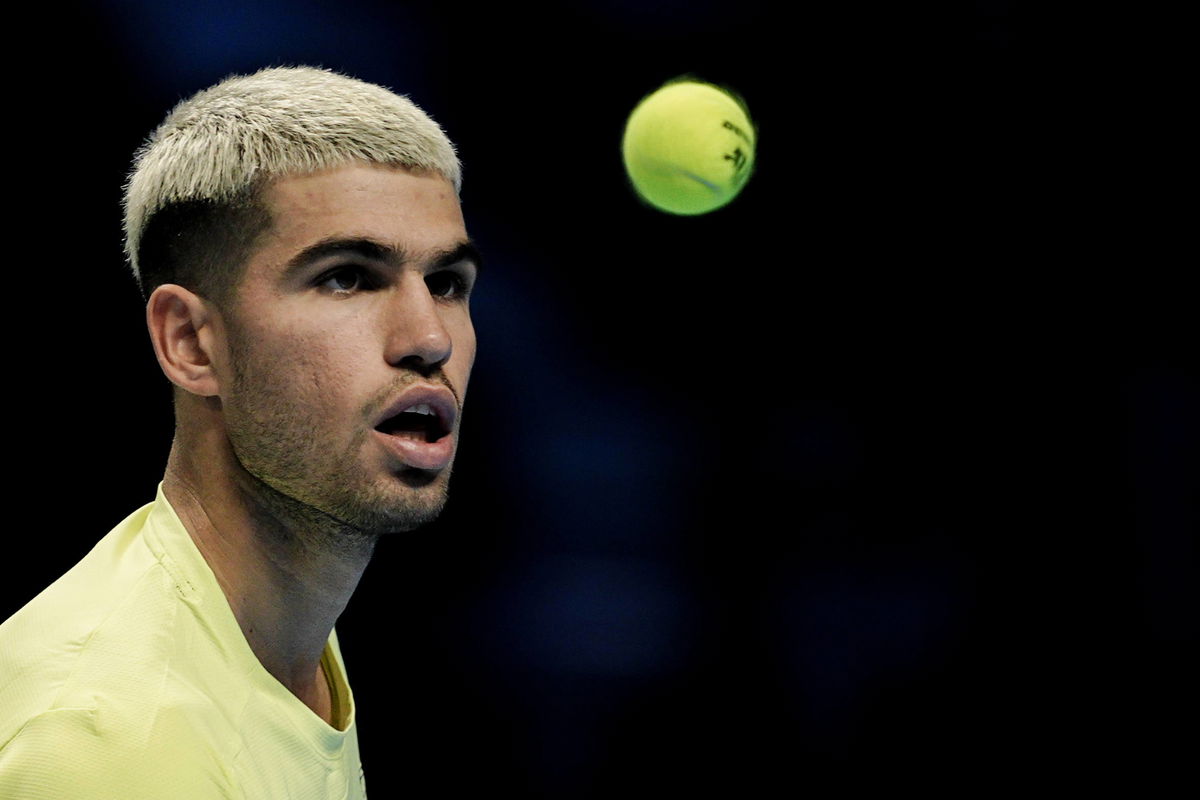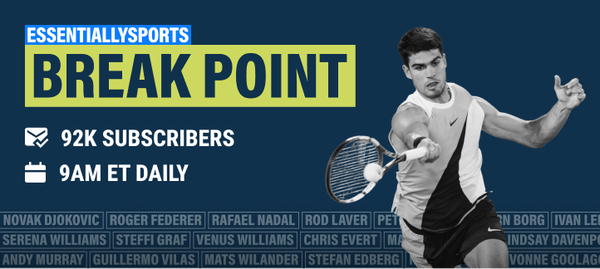Nov 11, 2025 | 12:13 PM EST

Imago
Spain s Carlos Alcaraz looks at the ball during the singles tennis match of the ATP, Tennis Herren World Tour Finals against Australia s Alex de Minaur at the Inalpi Arena in Turin, Italy – Sunday, Nov. 9, 2025. – . PUBLICATIONxNOTxINxITAxFRAxCHN Copyright: xMarcoxAlpozzi/LaPressex

Imago
Spain s Carlos Alcaraz looks at the ball during the singles tennis match of the ATP, Tennis Herren World Tour Finals against Australia s Alex de Minaur at the Inalpi Arena in Turin, Italy – Sunday, Nov. 9, 2025. – . PUBLICATIONxNOTxINxITAxFRAxCHN Copyright: xMarcoxAlpozzi/LaPressex

Imago
Spain s Carlos Alcaraz looks at the ball during the singles tennis match of the ATP, Tennis Herren World Tour Finals against Australia s Alex de Minaur at the Inalpi Arena in Turin, Italy – Sunday, Nov. 9, 2025. – . PUBLICATIONxNOTxINxITAxFRAxCHN Copyright: xMarcoxAlpozzi/LaPressex

Imago
Spain s Carlos Alcaraz looks at the ball during the singles tennis match of the ATP, Tennis Herren World Tour Finals against Australia s Alex de Minaur at the Inalpi Arena in Turin, Italy – Sunday, Nov. 9, 2025. – . PUBLICATIONxNOTxINxITAxFRAxCHN Copyright: xMarcoxAlpozzi/LaPressex
“My confidence went down a little bit.” That’s what 22-year-old Carlos Alcaraz said recently. Yes, the same Alcaraz who is right now world No. 1. Being famous brings attention, fans, and applause, but it also brings pressure, criticism, and sometimes heartbreak. For Alcaraz, who is so active on social media, it can also be tough. The praise feels good, but the negative comments can affect him, even his game. Now, he is opening up about it and how he is learning to handle it.
Watch What’s Trending Now!
Just recently, a fan page on X, Alcaraz Updates, shared a clip from Alcaraz’s interview on the YouTube channel Diario AS. Speaking in Spanish, he revealed the truth behind the likes and comments (translated to English): “There are losses that, honestly, I don’t care about. Reading negative comments about, in the end, both doing things right and doing things wrong, you will receive negative comments, either from people who are truly your fans or from people who are just haters.”
Carlos Alcaraz further added, “In the end, we try not to pay much attention to those comments. And yes, there have been certain losses where some negative comments do end up affecting you.” Even top players feel the sting of criticism, with Alcaraz joining the ranks of Coco Gauff, Marketa Vondrousova, and Taylor Fritz in speaking up about the online abuse that tennis players face.
🗣️"There are losses I honestly don’t care about the negative comments. Do things right or wrong, you'll still get negative comments, from true fans or haters. We try not to pay much attention but there have been certain losses where some negative comments do end up affecting you" pic.twitter.com/8M6D45fAhV
— Alcaraz Updates🐝 (@alcarazzupdates) November 11, 2025
Earlier this year, Carlos Alcaraz felt it firsthand after losing the Wimbledon final to Jannik Sinner. He went in as the two-time reigning champion but lost, despite grass being arguably his best surface.
The backlash was strong, and the pressure intense. During these times, he has relied on his psychologist, Isabel Balaguer, who has been working with him for years. Her guidance has helped him manage stress, stay focused, and keep a clear mind despite everything happening online.
“Yes, I’ve had her for about five years now, and she helps me a lot. I really feel the difference compared to the past,” Carlos Alcaraz told Italian outlet Gazzetta this year. “Sometimes I get negative thoughts, but she helps me manage them. She gives advice on handling match stress, and things have improved a lot.”
With her support, Alcaraz is learning to protect his mental health while chasing greatness on the court. But the pressure hasn’t only affected his performance; it’s also impacted his mental well-being.
From Carlos Alcaraz to Nick Kyrgios: the mental toll of elite sports
Carlos Alcaraz has admitted to going through phases of depression linked to the constant expectations of professional tennis. “I was often depressed on the court and during tournaments,” he said. “For me what matters isn’t winning or losing. It is about enjoying tennis.” But, as we know, like all high-profile entities, his confidence is occasionally shaken by criticism, high standards, and the fear of failing. But he knows how to handle it: it is his tight-knit support system that helps him, like his coach, physio, and psychologist.
But he isn’t the only one facing this struggle. Like Alcaraz, Nick Kyrgios has spoken openly about the mental toll of professional tennis. “I was having suicidal thoughts and was literally struggling to get out of bed… I was lonely, depressed, negative, abusing alcohol, drugs,” revealed the Australian. He even admitted to hiding self-harm scars on his arm with a compression sleeve during tournaments.
The pressure of being constantly watched made things worse. After losing the Wimbledon 2019 final to Rafael Nadal, he went into a psychiatric ward in London “to figure out my problems.” He recalled a wake-up call when he saw his father “full-blown crying.” With help from his psychologist and friends like Andy Murray, he began to recover. Kyrgios now shares his experience to help others, saying, “It’s OK. You are not alone. Please, don’t feel as if you are alone,” and adds, “But I’ve found that getting help and working on myself has helped me to feel better and to be better.”
Both Carlos Alcaraz and Kyrgios show us that behind every win, every trophy, and every highlight reel, there is a player dealing with real challenges that don’t necessarily go away even in the highest levels of the sport.



